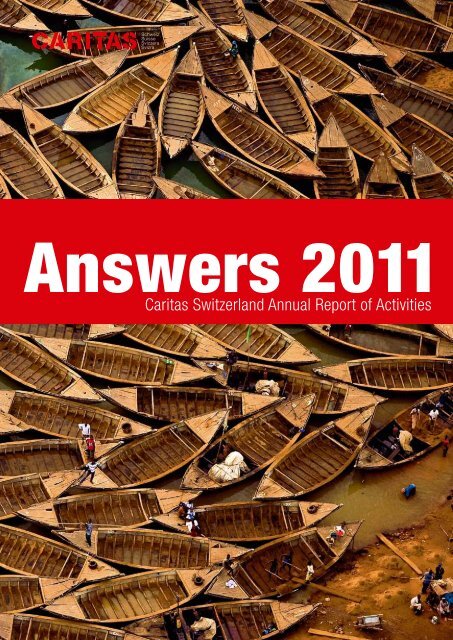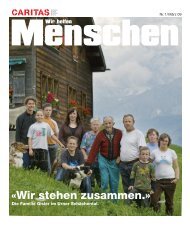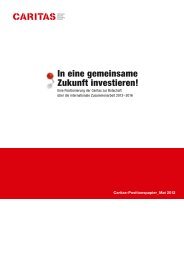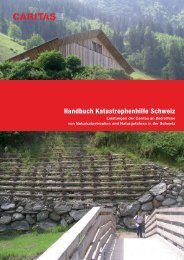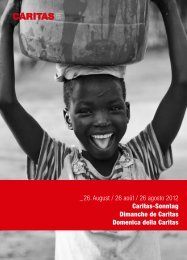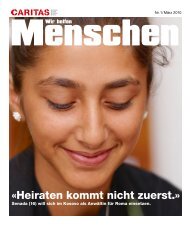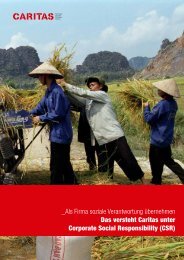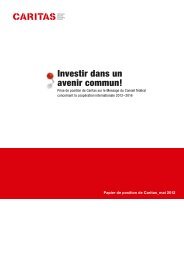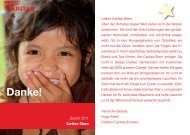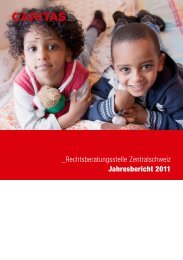Caritas Switzerland Annual Report of Activities - CARITAS - Schweiz
Caritas Switzerland Annual Report of Activities - CARITAS - Schweiz
Caritas Switzerland Annual Report of Activities - CARITAS - Schweiz
Create successful ePaper yourself
Turn your PDF publications into a flip-book with our unique Google optimized e-Paper software.
Answers 2011<br />
<strong>Caritas</strong> <strong>Switzerland</strong> <strong>Annual</strong> <strong>Report</strong> <strong>of</strong> <strong>Activities</strong><br />
1
2011<br />
2<br />
was marked by growing uncertainties in both eco<br />
nomic and social terms: The banking and finan<br />
cial crisis, monetary turbulence and an overvalued Swiss franc,<br />
confusion over the European project, and the difficult position <strong>of</strong><br />
<strong>Switzerland</strong> in this changed international environment. Added to<br />
this were the signs <strong>of</strong> a recession, manifested in a slump in demand<br />
and cutbacks in jobs.<br />
These difficult developments meant that another fundamental crisis,<br />
which was the focus <strong>of</strong> <strong>Caritas</strong>’ involvement in the past year,<br />
was pushed out <strong>of</strong> the headlines and forgotten: Drought and hunger<br />
in East Africa. According to UN estimates, around 13 million<br />
people were affected.<br />
Times <strong>of</strong> crisis also carry with them a challenge to focus on the<br />
essential in one’s own actions. In its position paper «For a viable<br />
and social <strong>Switzerland</strong>», <strong>Caritas</strong> formulated three policy guidelines,<br />
to coincide with the elections to the Federal parliament.<br />
Firstly, the decision by parliament that <strong>Switzerland</strong>’s development<br />
aid budget should be 0.5% <strong>of</strong> gross national product must not<br />
be reversed. The famine in the Horn <strong>of</strong> Africa shows how essential<br />
and urgently needed these funds are. Secondly, the policy regarding<br />
foreigners and refugees must be based on competence<br />
and objectivity. It is unacceptable to stir up nationalist sentiments<br />
while at the same time failing to come up with practical solutions.<br />
Finally: Two years ago, <strong>Caritas</strong> adopted the declaration to «halve<br />
poverty». We showed that in <strong>Switzerland</strong>, every tenth person is<br />
affected by poverty. Politicians must act to change this. Educa
tion policy and the introduction <strong>of</strong> additional benefits for families<br />
are key ingredients in a sustained policy to fight poverty.<br />
Without a secure livelihood for all, a stable and open society is<br />
not possible. This is what <strong>Caritas</strong> must constantly remind people<br />
<strong>of</strong> – through its practical involvement as well as its contribution<br />
to the debate on social policy.<br />
Dr. Fulvio Caccia Hugo Fasel<br />
President Director<br />
3<br />
Being accountable<br />
<strong>Caritas</strong> <strong>Switzerland</strong> <strong>Annual</strong> <strong>Report</strong> <strong>of</strong> <strong>Activities</strong>:<br />
With this annual report, we want to highlight the<br />
main areas <strong>of</strong> our aid work. We want to show who<br />
benefits from our aid, and what this aid consists <strong>of</strong>.<br />
The detailed financial report, as well as the list <strong>of</strong><br />
our numerous partners and donors, is published on<br />
our Website www.caritas.ch/annual_report<br />
Contents<br />
Editorial 2<br />
International<br />
Our work to ensure access to water 4<br />
Our commitment to assist the victims<br />
<strong>of</strong> the East African drought 8<br />
Human rights for all 12<br />
<strong>Caritas</strong> projects worldwide 14<br />
<strong>Switzerland</strong><br />
Our work in the fight against debt 16<br />
Assisting asylum seekers with legal advice 20<br />
Supporting mountain farmers in emergency situations 22<br />
Facts and figures<br />
Finances 2011 24<br />
In brief 26<br />
Strong partnerships 28<br />
Organs 30
Why do<br />
we need<br />
ever more<br />
water?<br />
The importance <strong>of</strong> water for human development is reflected<br />
in the fact that water consumption grows twice as<br />
fast as the world’s population. In many places, however,<br />
the basic need for water remains unmet. According to the<br />
UN, 900 million people still have no access to clean drinking<br />
water. The wrong or too intensive use <strong>of</strong> water, the contamination<br />
<strong>of</strong> worldwide water resources, urbanisation, but<br />
also poor management and waste are all barriers to efficient<br />
and sustainable water supplies. This leads to dire hygienic<br />
conditions. 2.6 billion people have no access to sanitary<br />
facilities. More than eighty per cent <strong>of</strong> diseases and<br />
a quarter <strong>of</strong> all deaths in developing countries are due to<br />
contaminated water. The inequitable distribution <strong>of</strong> water<br />
can also lead to hunger and conflict.<br />
5
Our work to ensure<br />
access to water<br />
Just as there are many different reasons for the lack <strong>of</strong> clean<br />
water, so differentiated responses are needed to address the<br />
problem. In its projects, <strong>Caritas</strong> <strong>Switzerland</strong> works with partner<br />
organisations and those directly affected to find the appropriate<br />
solution. It builds wells, spring catchments, cisterns, water retaining<br />
basins and irrigation systems for agriculture. Water committees,<br />
on which both women and men are represented, ensure<br />
equi table access and the necessary maintenance <strong>of</strong> the supply<br />
systems. In each water project, <strong>Caritas</strong> pays special attention to<br />
hygiene, for example by constructing latrines and organising<br />
hygiene courses.<br />
In the Cochabamba region <strong>of</strong> Bolivia,<br />
drinking water systems were constructed<br />
in 4 villages, with 165 water tap stands<br />
for 520 families, 3 schools, 3 health posts<br />
and 3 nurseries.<br />
6<br />
In South Sudan, 3,000 people in the<br />
federal state <strong>of</strong> Eastern Equatoria gained<br />
access to rain water from rock pools<br />
and were trained in hygiene measures.<br />
Thanks to a low-cost water cleaning<br />
system, around 500,000 litres<br />
<strong>of</strong> water were treated<br />
in Bangladesh. In 3 villages,<br />
648 households, 20 cookshops<br />
and 1 school benefited.
<strong>Caritas</strong> water projects in figures<br />
Number <strong>of</strong> beneficiaries<br />
<strong>of</strong> the <strong>Caritas</strong> water<br />
projects per continent<br />
7<br />
350 000<br />
300 000<br />
250 000<br />
200 000<br />
150 000<br />
100 000<br />
50 000<br />
0<br />
Africa<br />
In 2011, <strong>Caritas</strong> <strong>Switzerland</strong> invested CHF 3 million in the<br />
construction <strong>of</strong> drinking water supply systems, sanitary<br />
installations, irrigation systems for agriculture as well as<br />
hygiene programmes. In total, it reached around 725,000<br />
children, women and men with its water projects in Africa,<br />
Asia, Europe and America.<br />
Last year, the Federal government increased the<br />
budget for development cooperation with the goal <strong>of</strong><br />
improving the water supply <strong>of</strong> the poorest regions in<br />
particular. The Swiss Agency for Development and Cooperation<br />
(SDC) awarded a total <strong>of</strong> CHF 12 million to a<br />
consortium <strong>of</strong> eight Swiss aid agencies, coordinated by<br />
In 2011, the fight against cholera in<br />
Haiti helped to raise 450,000 people’s<br />
awareness <strong>of</strong> hygiene and preventive<br />
measures. 11,200 hygiene kits were<br />
distributed. 5,700 pupils benefited from<br />
new or repaired school latrines.<br />
Asia<br />
Europe<br />
America<br />
Helvetas and <strong>Caritas</strong> <strong>Switzerland</strong>. Of this, CHF 2.65<br />
million go to projects managed by <strong>Caritas</strong> <strong>Switzerland</strong> to<br />
assist more than 200,000 people in Ethiopia, Mali, South<br />
Sudan, Somaliland and Bangladesh.<br />
<strong>Caritas</strong> <strong>Switzerland</strong> stages hygiene training sessions<br />
using a programme developed by the World Health Organisation<br />
(WHO), which it has elaborated further to use<br />
specifically with children. The recently patented «Children<br />
Hygiene and Sanitation Training» (CHAST) is used by<br />
<strong>Caritas</strong> in Somaliland, South Sudan, Ethiopia, Kenya, Tanzania<br />
and now also in Haiti. 108,000 children benefited<br />
from it in 2011.<br />
In the mountain villages <strong>of</strong> T. Rahimov and<br />
Kubunion in Tajikistan, <strong>Caritas</strong> connected<br />
around 1,200 people to decentralised<br />
water systems operated by the village<br />
community.<br />
On the Dogon plateau in Mali,<br />
<strong>Caritas</strong> has supported the construction<br />
<strong>of</strong> 2 dams a year for the<br />
last 15 years. The water from one<br />
dam irrigates 3 hectares planted<br />
with onions.
How can<br />
East Africa<br />
be helped<br />
effectively?<br />
Around 13 million people were victims <strong>of</strong> the famine in East<br />
Africa in 2011, one <strong>of</strong> the most severe droughts in 60 years.<br />
How could this humanitarian tragedy happen? The disastrous<br />
food shortages in the Horn <strong>of</strong> Africa cannot be explained<br />
by the drought alone. The fact is that the extreme<br />
climate affected those regions already characterised by a<br />
weak and backward agriculture.<br />
8
Aid agencies have shown with their projects that agricultural<br />
production could be improved in many regions in<br />
Africa – through terracing, reforestation or with small dams<br />
which store the water in the rainy season. However, governments<br />
must introduce an agricultural policy that places the<br />
small producers and food security at the centre. That is<br />
how aid to East Africa would have a lasting effect.<br />
9
Our effort to assist<br />
the drought victims<br />
For <strong>Caritas</strong>, the central concerns <strong>of</strong> emergency and humanitar<br />
ian aid are to provide secure access to clean drinking water, mea<br />
sures to promote hygiene and health, and the supply <strong>of</strong> food to<br />
particularly vulnerable sections <strong>of</strong> the population such as infants,<br />
pregnant women and breastfeeding mothers, or sick and old<br />
people. In the second phase <strong>of</strong> humanitarian aid, the rehabilitation<br />
phase which follows the emergency aid, the focus is on<br />
repairing and extending water supply infrastructures – wells,<br />
pipelines, water storage systems and dams. A further aim is to<br />
promote sustainable agricultural production.<br />
In Kenya’s north-eastern region <strong>of</strong> Wajir,<br />
20,000 people gained access to clean<br />
water as well as fodder for their livestock.<br />
In addition, they were able to earn a<br />
small income by working in community<br />
projects.<br />
10<br />
In the Somali region <strong>of</strong> Gedo, 3,800<br />
farming families received seeds to prepare<br />
for the next planting period.<br />
In the Ethiopian region <strong>of</strong> Borena,<br />
<strong>Caritas</strong> supported 775 households<br />
with food items and provided<br />
fodder for 1,302 cows.
About the projects in the Horn <strong>of</strong> Africa<br />
An overview <strong>of</strong> emergency aid<br />
<strong>Caritas</strong> <strong>Switzerland</strong> implemented eleven emergency aid<br />
projects in 2011 to help the drought victims in East Africa,<br />
namely in Ethiopia, Kenya, Somaliland and Somalia. The<br />
financial volume <strong>of</strong> these projects amounted to CHF 7.4<br />
million. They reached a total <strong>of</strong> 280,000 people. For the<br />
second phase <strong>of</strong> humanitarian aid, the recovery phase,<br />
ten projects amounting to CHF 7.3 million are planned.<br />
<strong>Caritas</strong> funded its famine relief through its own donations<br />
and donations from the international <strong>Caritas</strong> network.<br />
It also received contributions from Glückskette<br />
(Swiss Solidarity), the Swiss Confederation’s Humanitarian<br />
Aid (SDC), and UN Humanitarian Aid.<br />
The examples <strong>of</strong> Ethiopia and Somaliland<br />
Access to water, improvements in hygiene and medical<br />
support were the main foci in Somaliland (Hargeisa,<br />
Burao), where <strong>Caritas</strong> has been active for many years.<br />
In the Tigray region in northern Ethiopia, a large proportion<br />
<strong>of</strong> the rural population lost its livelihood due to<br />
the severe drought. As part <strong>of</strong> an employment programme,<br />
the farmers built 18 dams that greatly improve<br />
the water supply. Households that have lost their livestock<br />
were provided with sheep and goats. Finally, pupils<br />
were given extra food in schools, ensuring that they did<br />
not stop attending lessons.<br />
Kenya – Help for refugees and local people<br />
Wajir, Garissa, Turkana (Lodwar), Kericho, Kitui and<br />
Marsabit are the regions in the north and north-east <strong>of</strong><br />
Kenya where <strong>Caritas</strong> provided emergency aid. The main<br />
focus was on three areas: In Wajir, 20,000 people were<br />
given access to clean water as well as fodder for their<br />
livestock. People also had an opportunity to earn money<br />
to buy food, by working in community projects – for<br />
example repairing dams and water reservoirs. In Marsabit,<br />
<strong>Caritas</strong> also provided drinking water for 25,000 people. In<br />
Turkana, 3,000 malnourished children were given food<br />
supplements, and 12,000 school children were provided<br />
with a hot meal for 60 days. In the refugee camp <strong>of</strong><br />
Kambioos near Garissa, which gave shelter to families<br />
from Somalia, <strong>Caritas</strong> <strong>Switzerland</strong> erected 1,500 hygiene<br />
stations with toilets as well as washing and shower facilities.<br />
24,000 people benefited from this aid.<br />
11<br />
Lodwar<br />
Kericho<br />
Marsabit<br />
Kenya<br />
Adigrat<br />
Ethiopia<br />
Borena<br />
Moyale<br />
Wajir<br />
Garissa<br />
Kitui<br />
Hargeisa<br />
Gedo<br />
Merka<br />
Burao Sool<br />
Somalia<br />
Somaliland<br />
The tragedy <strong>of</strong> a failed state<br />
Humanitarian work faced particular difficulties in Somalia,<br />
which is considered a «failed state». Inside the country,<br />
Al Shahab Islamists, regional warlords, clan leaders and<br />
soldiers <strong>of</strong> the transitional government are engaged in a<br />
power struggle. As a result, the famine crisis in Somalia<br />
worsened considerably. While the country urgently needs<br />
a political solution and an end to violence, it is clear that<br />
the starving population depends on outside aid.<br />
That’s why <strong>Caritas</strong> worked actively with its partner<br />
organisations in the Gedo and Merka regions. Hungry<br />
families were provided with food, drinking water and<br />
medical care. To prepare for the next planting period,<br />
3,800 farming families in the Gedo region were given<br />
seeds.
How do<br />
people achieve<br />
their rights?<br />
Every person has the right to a life in dignity, irrespective<br />
<strong>of</strong> religion, gender or nationality. This is now accepted in<br />
principle by virtually all countries. And yet, countless people<br />
live in poverty and suffer discrimination. Human rights<br />
will only become effective when governments incorporate<br />
them in their laws and all citizens can meet their basic<br />
needs and claim their rights.<br />
12
Our support for human rights for all<br />
With its projects to promote human rights and social<br />
justice, <strong>Caritas</strong> works on behalf <strong>of</strong> poor and disadvantaged<br />
population groups to enable them to participate in<br />
society and live their life in dignity and peace. <strong>Caritas</strong><br />
supports groups that are particularly vulnerable, including<br />
women, children or indigenous groups and minorities. In<br />
2011, the <strong>Caritas</strong> projects around the world enabled<br />
190,000 people to gain access to social institutions, and<br />
460,000 people benefited from health services. 220,000<br />
people learned in workshops about human rights and<br />
peace promotion which rights they could claim and how<br />
to participate in political life. Thanks to education projects,<br />
120,000 children and young people were able to<br />
attend primary school.<br />
The example <strong>of</strong> Guatemala: In the Petén and Ixil<br />
regions, <strong>Caritas</strong> helps indigenous communities who are<br />
victims <strong>of</strong> discrimination, so that the truth about the civil<br />
war is uncovered and the people receive compensation<br />
from the political authorities. For example, in the Ixil<br />
region, 28 indigenous communities have submitted their<br />
truth list to the National Compensation Programme. Many<br />
<strong>of</strong> them were forcibly displaced from their land and their<br />
villages by military and paramilitary forces.<br />
The example <strong>of</strong> Palestine: Thanks to <strong>Caritas</strong>, 3,500<br />
children traumatised by war were given access to therapy,<br />
psychosocial care, leisure activities and special<br />
tutoring. This helps them to regain their confidence, and<br />
to make a contribution to peace when they become<br />
adults.<br />
The example <strong>of</strong> Ethiopia: Although 80 per cent <strong>of</strong> all<br />
children now have access to a primary school, the infrastructure<br />
in the rural areas is still poor, and working in the<br />
In the Republic <strong>of</strong> Moldova, 150 disadvantaged<br />
young people gained access<br />
to education and were able to start<br />
an independent life, thanks to work, an<br />
income and accommodation.<br />
13<br />
Access to<br />
social<br />
institutions<br />
19,2<br />
Access to primary school<br />
In the Guatemalan region <strong>of</strong> Ixil, 28 indigenous<br />
communities who were victims in<br />
the civil war have called for truth finding<br />
and reparations.<br />
12,1<br />
Beneficiaries <strong>of</strong> <strong>Caritas</strong><br />
human rights projects by<br />
topic<br />
%<br />
46,5<br />
22,2<br />
Access to health<br />
services<br />
Attendance at<br />
a workshop on<br />
human rights and<br />
peace promotion<br />
home and in the fields is <strong>of</strong>ten seen as more important.<br />
<strong>Caritas</strong> helped to ensure that a total <strong>of</strong> 6,750 children<br />
were able to attend school or nursery school in 2011.<br />
The example <strong>of</strong> Myanmar: On its difficult road to<br />
greater democratic participation, the country needs<br />
educated leaders who can organise and build links with<br />
the population according to democratic principles. In<br />
2011, 66 women and men from the most disadvantaged<br />
population groups, as well as 144 high school graduates,<br />
were given training to enable them to take on a key role in<br />
the country’s development and its civil society.<br />
In 2011, 300 Indian maidservants<br />
were given training in their basic<br />
rights regarding working hours,<br />
minimum wage and health insurance.
<strong>Caritas</strong> projects<br />
worldwide<br />
1 In Bangladesh, <strong>Caritas</strong> and a<br />
partner organisation informed 100,000<br />
female migrant workers about how they<br />
can protect themselves against human<br />
trafficking and indebtedness.<br />
2<br />
In Bolivia, <strong>Caritas</strong> strengthened 12<br />
municipalities in La Paz so they are able<br />
to <strong>of</strong>fer social assistance to the poorest<br />
people. In 2011, 138 volunteers were<br />
trained, the municipalities were given<br />
organisational advice, and are now<br />
well-equipped for the future.<br />
3<br />
The peace promotion programme <strong>of</strong><br />
multi-ethnic communities in the Srebrenica/Bratunac<br />
region in Bosnia was<br />
extended to 2 more municipalities in<br />
2011. In total, 16 village communities are<br />
involved in small-scale democratic projects.<br />
4<br />
In Chad, 5,800 farmers were able to<br />
take out a loan in 2011 from a non-pr<strong>of</strong>it<br />
making micr<strong>of</strong>inance institution in order<br />
to buy seeds, improve their production<br />
and thus increase their income.<br />
5<br />
In Columbia, <strong>Caritas</strong> and 10 other<br />
organisations jointly manage the peacepromotion<br />
programme SUIPPCOL. 350<br />
women’s organisations in 9 regions are<br />
now part <strong>of</strong> «Ruta Pacífica», a network<br />
to promote peace.<br />
6<br />
In northern Ethiopia, 22 water<br />
points were built in 2011, with the<br />
involvement <strong>of</strong> the local people. This<br />
gave more than 10,000 people access<br />
to clean drinking water. Newly formed<br />
water committees are responsible for<br />
maintenance and for hygiene issues.<br />
14<br />
31<br />
20<br />
7<br />
In Haiti, <strong>Caritas</strong> enables children and<br />
young people to attend school both in<br />
the north-eastern town <strong>of</strong> Gonaïves and<br />
in Trou Sable in the south-west. In total,<br />
7,080 children and young people benefited<br />
from the school programme in the<br />
past year.<br />
18<br />
11<br />
17<br />
7<br />
5<br />
2<br />
15<br />
21<br />
8<br />
In the Indian state <strong>of</strong> Bihar, 858<br />
casteless Dalit families developed 600<br />
acres <strong>of</strong> land by levelling and clearing it<br />
and installing irrigation systems, enabling<br />
them to cultivate it.<br />
10
43<br />
24<br />
34<br />
30<br />
3<br />
14<br />
4<br />
47<br />
38 32<br />
9<br />
40<br />
29<br />
19<br />
12<br />
9<br />
29 Roma families from Kosovo, who<br />
had been living next to a rubbish dump<br />
in the town <strong>of</strong> Gjakova, were provided<br />
with new homes. The project also<br />
enabled the Roma children to go to<br />
school and created 20 new jobs.<br />
15<br />
23<br />
36<br />
6<br />
41<br />
46<br />
26<br />
44<br />
39<br />
35<br />
13<br />
27<br />
8<br />
42<br />
1<br />
33<br />
28<br />
45<br />
16<br />
48<br />
22<br />
37<br />
25<br />
10<br />
In Mali, around 3,000 prostitutes<br />
were able to improve their lives thanks<br />
to being part <strong>of</strong> the association «Danaya<br />
So» (House <strong>of</strong> Trust). One <strong>of</strong> the benefits<br />
is a free monthly health check.<br />
11<br />
In northern Nicaragua, 200 farming<br />
families were able to substantially increase<br />
the agricultural yields on their<br />
plots thanks to the introduction <strong>of</strong><br />
various soil protection measures. They<br />
also developed protection plans against<br />
flooding.<br />
12<br />
In South Sudan, <strong>Caritas</strong> completed<br />
the construction <strong>of</strong> an agricultural training<br />
centre in 2011. In future, the centre<br />
will provide training for advisers from the<br />
local agricultural authority, farming cooperatives<br />
and farming families.<br />
13<br />
In Muminabad, Tajikistan, 450<br />
women generated new income from<br />
milk processing, vegetable cultivation<br />
and drying <strong>of</strong> medicinal herbs and fruit.<br />
As a result, household income rose by<br />
30 per cent on average.<br />
14 Albania<br />
15 Brazil<br />
16 Cambodia<br />
17 Chile<br />
18 Cuba<br />
19 Egypt<br />
20 Guatemala<br />
21 Ivory Coast<br />
22 Indonesia<br />
23 Iraq<br />
24 Italy<br />
25 Japan<br />
26 Kenya<br />
27 Kyrgyzstan<br />
28 Laos<br />
29 Lebanon<br />
30 Malta<br />
31 Mexico<br />
32 Moldova<br />
33 Myanmar<br />
34 Niger<br />
35 Pakistan<br />
36 Palestine<br />
37 Philippines<br />
38 Romania<br />
39 Russia<br />
40 Rwanda<br />
41 Somalia<br />
42 Sri Lanka<br />
43 <strong>Switzerland</strong><br />
44 Tanzania<br />
45 Thailand<br />
46 Uganda<br />
47 Ukraine<br />
48 Vietnam<br />
■ Priority countries<br />
■ Other countries <strong>of</strong> operation<br />
Emergency aid in 2011<br />
On conformal world maps, the<br />
countries <strong>of</strong> the north are shown as<br />
much larger than they actually are.<br />
The Peters world map reproduced<br />
here shows the correct proportions.<br />
In return, it accepts a distortion in the<br />
equatorial region.
Does debt<br />
counselling<br />
help to tackle<br />
poverty?<br />
If people cannot repay their debts they only have themselves<br />
to blame. This commonly held opinion falls short <strong>of</strong><br />
the mark in many cases. Because a financial commitment<br />
entered into in good times can suddenly become an existential<br />
problem if unforeseen events occur: losing one’s<br />
job, a serious illness, a divorce. Suddenly, bills pile up that<br />
cannot be paid on time. <strong>Caritas</strong>’ experience shows that<br />
16
many people’s lives today do not progress in a straight line,<br />
and are <strong>of</strong>ten characterized by breaks. So it is not surprising<br />
that in <strong>Switzerland</strong>, 570,000 people have substantially<br />
overdrawn their account or fallen into arrears with payments.<br />
It is high time that society addresses this issue. An<br />
effective recipe against sliding into excessive debt and<br />
poverty is early debt counselling.<br />
17
Our involvement in<br />
the fight against debt<br />
The sooner debt counselling starts, the greater are the chances<br />
<strong>of</strong> success. The service provided by <strong>Caritas</strong> makes access to help<br />
as easy as possible. A Website dealing with questions about debt,<br />
online advice, a telephone debt hotline as well as a decentralised<br />
network <strong>of</strong> easytoaccess debt advice centres <strong>of</strong>fer quick and<br />
uncomplicated assistance. In addition, <strong>Caritas</strong> <strong>Switzerland</strong> trains<br />
migrants as course tutors who then talk to their compatriots in<br />
their mother tongue and raise their awareness about money,<br />
consumption and debt issues. Finally, <strong>Caritas</strong> also campaigns at<br />
the political level for better conditions in the fight against overindebtedness.<br />
The telephone hotline <strong>Caritas</strong> debt counselling<br />
at 0800 708 708 meets a great<br />
need. A call is received every 15 minutes.<br />
18<br />
The course tutors trained by <strong>Caritas</strong><br />
conducted 172 courses on money,<br />
consumption and debt issues with a<br />
total <strong>of</strong> 1,186 participants.<br />
In the past year, the <strong>Caritas</strong><br />
Website in 10 languages,<br />
www.caritas-schuldenberatung.ch<br />
(<strong>Caritas</strong> debt counselling), was<br />
visited 5,000 times.
<strong>Caritas</strong> debt projects in figures<br />
<strong>Caritas</strong> debt counselling is integrated into the broader<br />
social counselling service, which also allows social and<br />
family problems to be addressed with the people concerned.<br />
In 2009, <strong>Caritas</strong> established a long-term cooperation<br />
with the Aduno Group and Pro Juventute under<br />
the name <strong>of</strong> «Plan B». In cooperation with the regional<br />
<strong>Caritas</strong> organisations and other specialist agencies, it has<br />
significantly expanded the service provision <strong>of</strong> debt<br />
counselling and prevention.<br />
Telephone hotline and Website<br />
The <strong>Caritas</strong> dept counselling hotline is free <strong>of</strong> charge and<br />
can be accessed anonymously. In 2011, 2,482 telephone<br />
consultations were conducted via the hotline. The Website<br />
www.caritas-schuldenberatung.ch (<strong>Caritas</strong> debt<br />
counselling) provides answers to the most important<br />
questions, tips for everyday life, and online advice. The<br />
main contents and a debt test are available in ten languages.<br />
In 2011, a total <strong>of</strong> 713 people made use <strong>of</strong> the<br />
opportunity <strong>of</strong> online counselling. The feedback is positive:<br />
91 per cent <strong>of</strong> the Website visitors found the information<br />
useful, and 98 per cent were satisfied with the<br />
telephone advice.<br />
19<br />
Personal advice<br />
Online advice<br />
17<br />
25<br />
Debt counselling in percent<br />
according to type <strong>of</strong> advice<br />
%<br />
Telephone<br />
advice<br />
Debt counselling<br />
<strong>Caritas</strong> was able to extend the debt counselling service,<br />
which is available throughout <strong>Switzerland</strong>, by ten per cent<br />
as part <strong>of</strong> «Plan B». This enabled it to <strong>of</strong>fer comprehensive<br />
personal advice last year to an additional 1,058<br />
households. The legal advice service <strong>of</strong>fered by <strong>Caritas</strong><br />
<strong>Switzerland</strong> supported the regional debt counselling<br />
centres in 444 cases.<br />
Prevention and public relations work<br />
<strong>Caritas</strong> trained 65 course tutors to conduct courses on<br />
money, consumption and debt. It publicised its debt<br />
counselling and prevention service, and worked to increase<br />
public awareness <strong>of</strong> the problem <strong>of</strong> overindebtedness.<br />
With success: Around 150 media reports were<br />
published in 2011 about <strong>Caritas</strong>’ involvement in the issue<br />
<strong>of</strong> debt. In addition, <strong>Caritas</strong> commented on political<br />
initiatives about the debt issue, and staged a joint seminar<br />
with the University <strong>of</strong> Applied Sciences North-Western<br />
<strong>Switzerland</strong> on the subject <strong>of</strong> «Fighting poverty through<br />
debt counselling», with 125 participants.<br />
58
Third-class<br />
citizens?<br />
Headlines about high numbers <strong>of</strong> immigrants, demands that<br />
restrictions be imposed, as well as housing problems all<br />
sensationalise asylum policy. Asylum seekers face harsh<br />
conditions in <strong>Switzerland</strong>. What gets forgotten is that every<br />
person has the right to apply for asylum in another country.<br />
Based on this basic principle <strong>of</strong> human rights, all asylum<br />
seekers have the right to a fair and proper process.<br />
20
Assisting asylum seekers with legal advice<br />
Africa<br />
Ethiopia 3%<br />
Eritrea 18%<br />
Somalia 8%<br />
Other Africa 16%<br />
Origin <strong>of</strong> the individuals<br />
given advice by continent<br />
Other, stateless or no<br />
details: 1 %<br />
With its two legal advice centres in Central <strong>Switzerland</strong><br />
and in the Canton <strong>of</strong> Fribourg, <strong>Caritas</strong> <strong>Switzerland</strong> advocates<br />
and supports an asylum procedure that is based on<br />
human rights and the rule <strong>of</strong> law. The aim <strong>of</strong> its advice<br />
sessions is to explain the legal provisions and the procedures<br />
to asylum seekers. In a first interview, <strong>Caritas</strong>’ legal<br />
advisers assess their clients’ chances <strong>of</strong> success. <strong>Caritas</strong><br />
only takes on the legal representation <strong>of</strong> asylum seekers if<br />
there are concrete chances <strong>of</strong> success: if the conditions<br />
<strong>of</strong> qualifying for refugee status were not correctly assessed<br />
or insufficiently examined, if a removal order was<br />
made unjustly, or if grave procedural mistakes were<br />
made.<br />
At the same time, <strong>Caritas</strong> operates a repatriation<br />
advice centre on behalf <strong>of</strong> the central Swiss Cantons<br />
<strong>of</strong> Obwalden, Schwyz and Zug, which supports asylum<br />
seekers willing to return home with reintegration in their<br />
country.<br />
Last year, <strong>Caritas</strong> carried out 963 legal<br />
consultations for asylum seekers.<br />
Of the persons receiving advice, most<br />
came from Eritrea.<br />
21<br />
Europe<br />
Kosovo 4%<br />
Turkey 4%<br />
Other Europe 5%<br />
Asia (incl. Middle East)<br />
Afghanistan 7%<br />
China 4%<br />
Iraq 5%<br />
Iran 6%<br />
Sri Lanka 9%<br />
Syria 3%<br />
Other Asia incl. Middle East 7%<br />
In Zug and Nidwalden, <strong>Caritas</strong> also supports unaccompanied<br />
minor asylum seekers on behalf <strong>of</strong> these<br />
Cantons. Finally, <strong>Caritas</strong> operates accommodation centres<br />
in the Cantons <strong>of</strong> Schwyz and Obwalden.<br />
In the past year, <strong>Caritas</strong> conducted a total <strong>of</strong> 963 legal<br />
advice sessions for asylum seekers. The persons seeking<br />
advice came from many different countries: Most advice<br />
seekers were from Eritrea (18 per cent), Sri Lanka (9 per<br />
cent), Afghanistan (7 per cent) and Somalia (8 per cent).<br />
In 85 cases, <strong>Caritas</strong> filed a complaint. Two thirds <strong>of</strong> the<br />
petitions to the Federal Administrative Court were approved.<br />
By comparison, the Federal Administrative<br />
Court’s general approval rate in recent years has only<br />
been around 15 per cent. In practical terms, these individuals<br />
gained the right to further investigations, an order<br />
to entertain an application (Eintretensentscheid), or the<br />
right to asylum. This high success rate is attributable in<br />
particular to the strict selection criteria when taking on a<br />
case.<br />
99 individuals were able to receive<br />
pr<strong>of</strong>essional legal representation thanks to<br />
<strong>Caritas</strong> <strong>Switzerland</strong> taking on their case.<br />
In 86 cases, the persons<br />
receiving advice involved families<br />
with children, and in 877 cases<br />
individual asylum seekers.
Why do<br />
mountain<br />
farmers<br />
need help?<br />
The Swiss mountains are a part <strong>of</strong> our homeland that is<br />
looked after by mountain farmers. But the farmers are<br />
under pressure: They have to become competitive entrepreneurs<br />
and survive in the market. It is important to shape<br />
structural change so it is socially acceptable. Solidarity<br />
between the regions must not be called into question. And<br />
it pays <strong>of</strong>f: The mountain farmers preserve a rich and<br />
varied cultural landscape that everyone can enjoy.<br />
22
Volunteers support mountain farmers in emergencies<br />
Every day, the mountain farmers work hard on steep<br />
slopes. But the strenuous work is spread across ever<br />
fewer shoulders, and at the end <strong>of</strong> a long day, there is not<br />
much income to show for it. It doesn’t take a lot for a<br />
mountain farmer’s family to find itself unable to cope with<br />
the workload. An accident, an illness or a pregnancy<br />
are enough to seriously reduce a family’s labour resources.<br />
A landslide, an avalanche, a fire or just a fairly<br />
major repair on the house or a necessary new building<br />
can mean extra work for which there are not enough<br />
hands. Sometimes, this relentless pressure, without the<br />
chance <strong>of</strong> a break, leads to a situation where help with<br />
childcare, in the household or in the field is urgently<br />
needed.<br />
To provide support in such situations, <strong>Caritas</strong> recruits<br />
volunteer helpers for mountain farmers in emergency<br />
situations via its Website www.bergeinsatz.ch (in German<br />
and French). They can provide temporary relief to those<br />
in need, and help to keep the farm going in difficult situations.<br />
Conversely, the temporary work is an opportunity<br />
for the volunteers to have active time out from their<br />
normal life, and at the same time do something meaningful<br />
for themselves and others – from haymaking via<br />
childcare to building a new stable. Working together<br />
builds bridges, and creates the kind <strong>of</strong> solidarity that is<br />
necessary to ensure the long-term balance between<br />
the city and the countryside.<br />
In the past year, <strong>Caritas</strong> recruited around 900 volunteers<br />
aged between 18 and 70 to assist 123 mountain<br />
In 2011, <strong>Caritas</strong> volunteers carried out<br />
mountain missions with 123 families.<br />
In total, volunteer work was carried out<br />
on 6,330 days.<br />
23<br />
Illness and<br />
accident<br />
20<br />
Construction work<br />
on the farm<br />
17<br />
Reasons for the use <strong>of</strong> a<br />
volunteer in a mountain<br />
farmer’s family<br />
In the last year, <strong>Caritas</strong> recruited 890<br />
volunteers to work with mountain<br />
farmers in German and French-speaking<br />
<strong>Switzerland</strong>.<br />
%<br />
Excessive workload<br />
Care and<br />
supervision <strong>of</strong><br />
family members<br />
farmers’ families throughout <strong>Switzerland</strong>. The reasons for<br />
these vital mountain missions were: Construction work on<br />
the farm (17 per cent), illness and accident (20 per cent),<br />
excessive workload (45 per cent) and care and supervision<br />
<strong>of</strong> family members (18 per cent). With these actions,<br />
<strong>Caritas</strong> contributes to solving social problems as well as<br />
maintaining natural livelihoods. It also encourages voluntary<br />
work.<br />
18<br />
45<br />
The most frequent reason (45 per<br />
cent) for a volunteer mission<br />
was the excessive workload <strong>of</strong><br />
the mountain farmer’s family.
<strong>Caritas</strong> in figures<br />
Balance as per 31 December 2011 2011 2010<br />
Assets CHF CHF<br />
Liquid assets 11’861’577 13’656’154<br />
Securities 23’593’162 24’515’032<br />
Accounts receivable 4’827’002 3’650’204<br />
Inventories 2’242’968 2’275’551<br />
Other current assets 4’403’150 588’514<br />
Fixed assets 13’116’559 12’841’318<br />
Total assets 60’044’419 57’526’773<br />
Liabilities<br />
Short-term liabilities 1’611’037 1’934’910<br />
Long-term liabilities 3’546’071 4’317’387<br />
Value fluctuation funds 274’916 274’916<br />
Funds capital (earmarked funds) 54’118’961 50’496’172<br />
Organisational capital 493’435 503’389<br />
Total liabilities 60’044’419 57’526’773<br />
Consolidated operating account 2011<br />
Operating income and operational performance<br />
Donations 27’953’091 30’147’533<br />
Contributions from third parties 33’501’916 35’492’447<br />
Total income from donations and private contributions 61’455’007 65’639’980<br />
Contributions from the public authorities 24’139’325 20’901’835<br />
Other operating income (income from services) 8’849’510 8’723’988<br />
Total operating income 94’443’842 95’265’803<br />
International cooperation 53’268’289 55’346’023<br />
Work in <strong>Switzerland</strong> 19’661’984 18’992’227<br />
Fair Trade 4’242’241 4’785’020<br />
Clothing Centre 1’791’640 1’600’858<br />
Research and other project contributions 620’880 899’710<br />
Information and communication (education and information work) 1’997’021 2’020’454<br />
Direct administrative project support (evaluation, IT, rents etc.) 1’650’686 1’697’830<br />
Total project expenditure 83’232’742 85’342’120<br />
Collection and fundraising costs 3’758’621 3’820’255<br />
Other administrative costs 3’696’456 4’267’677<br />
Total administrative costs 7’455’077 8’087’932<br />
Total expenditure for operational performance 90’687’819 93’430’052<br />
Operating result (corresponds to EBIT) 3’756’023 1’835’750<br />
Financial income and other result<br />
Total financial income (securities, interest; net) 124’595 989’366<br />
Total other result (extraordinary) –257’829 –496’825<br />
<strong>Annual</strong> result (change in funds) 3’622’789 2’328’291<br />
The detailed financial report is available on the Internet at www.caritas.ch/annual_report<br />
24
Sources<br />
<strong>of</strong> <strong>Caritas</strong> income<br />
Donations<br />
Own<br />
revenue<br />
25<br />
Public sector contributions<br />
and private contributions<br />
from third parties<br />
Thanks to financing alliances with Swiss Solidarity, the Federal Government as well as other partner organisations at home<br />
and abroad, <strong>Caritas</strong> is able to more than triple the effect <strong>of</strong> each donated Swiss franc.<br />
Use<br />
<strong>of</strong> revenues<br />
International<br />
cooperation<br />
Administrative<br />
support<br />
29,6<br />
9,4<br />
58,7<br />
Depreciation 0,4<br />
5,3<br />
Information and communication<br />
%<br />
%<br />
6,9<br />
35,5<br />
6,6<br />
25,5<br />
21,7<br />
Public sector<br />
contributions<br />
Private<br />
contributions<br />
from third<br />
parties<br />
Inland<br />
and<br />
Network<br />
Fairtrade and<br />
Clothing Centre<br />
0,4 Research<br />
Cantons<br />
and communes<br />
Federal go -<br />
vernment<br />
other<br />
Fundraising<br />
and administration<br />
Projects<br />
These figures have been collected in conformity with the rules <strong>of</strong> Swiss GAAP FER 21 and in accordance with the<br />
requirements <strong>of</strong> the ZEWO Foundation on the determination <strong>of</strong> administrative expenses <strong>of</strong> non-pr<strong>of</strong>it organisations.<br />
2,1<br />
91,8<br />
%<br />
4,1 4,1<br />
International<br />
<strong>Caritas</strong>-<br />
Network<br />
SDC<br />
18,4<br />
Swiss<br />
Solidarity<br />
24,1<br />
Other<br />
organisations<br />
21,4<br />
11,2<br />
%<br />
22,8<br />
Fundraising<br />
and public relations<br />
Other administrative<br />
expenses
In brief<br />
26<br />
Almost free holidays for poor families<br />
Since October 2011, poor families have been able to book a holiday<br />
simply by presenting a <strong>Caritas</strong> pass, the so-called KulturLegi, and travel<br />
almost free <strong>of</strong> charge, without undue bureaucracy. Every year the Swiss Travel<br />
Fund (Reka), in cooperation with <strong>Caritas</strong>, <strong>of</strong>fers 100 holiday arrangements. At<br />
a solidarity price <strong>of</strong> only CHF 100.00, a holiday apartment or accommodation<br />
in a youth hostel can be booked for one week. Reka also contributes CHF<br />
50.00 to the travel costs per family member.<br />
650 tons <strong>of</strong> clothing<br />
Young people get involved<br />
The <strong>Caritas</strong> Clothing Centre in Waldibrücke collected and sorted around 650<br />
tons <strong>of</strong> well-preserved clothes and shoes in 2011. 280 tons were sent to<br />
<strong>Caritas</strong> partner organisations around the world. In <strong>Switzerland</strong>, 4,000 socially<br />
disadvantaged people were provided with clothes, including 1,300 at the<br />
request <strong>of</strong> Winter Aid <strong>Switzerland</strong>. In addition, 1,500 asylum seekers and<br />
refugees received basic clothing. The social enterprise employs around 25<br />
people, some <strong>of</strong> them in the framework <strong>of</strong> projectsfor unimployed people.<br />
Ten projects, implemented by 150 young people, were entered for the young-<br />
<strong>Caritas</strong> award 2011. They were active in campaigns for children in Haiti, for<br />
example, or for vegetarian and fair-trade food in the student cafeterias. The<br />
prize went to the rapper «Cyphermaischter» for his song «Sai» against child<br />
prostitution. The audience prize was awarded to the apprentices <strong>of</strong> the vocational<br />
college Polybau in Uzwil, who renovated school building ro<strong>of</strong> in the<br />
Bosnian town <strong>of</strong> Olovo. Other project examples are at www.youngcaritas.ch.<br />
<strong>Caritas</strong> markets in Baar, Biel and Baden<br />
Three new <strong>Caritas</strong> markets were opened last year. People suffering financial<br />
hardship can now also buy basic food items, fresh produce and hygiene<br />
artic les at greatly reduced prices in Baar, Biel and Baden. There are currently<br />
23 markets throughout <strong>Switzerland</strong>. The first one opened in 1992 under the<br />
name <strong>of</strong> «Carisatt» in Basel. The <strong>Caritas</strong> markets are usually social enterprises<br />
– a large proportion <strong>of</strong> people working there are unemployed: they can enhance<br />
their prospects in the job market through this temporary employment.
27<br />
Inequality is on the increase<br />
The lower income groups, the poor and needy in <strong>Switzerland</strong>, were scarcely<br />
able to benefit from the improved economic situation, as the Social Almanac<br />
published by <strong>Caritas</strong> at the end <strong>of</strong> 2011 noted. Thus, the number <strong>of</strong> individuals<br />
earning more than a million Swiss francs a year rose fivefold between<br />
1997 and 2008, while average gross income, adjusted for prices, has barely<br />
risen since 1998. Figures released by the Federal Statistical Office show that<br />
between 8 and 14.6 per cent <strong>of</strong> the Swiss population are at risk <strong>of</strong> poverty.<br />
Recycling <strong>of</strong> old vegetable oil in Bali<br />
Scapa draws for <strong>Caritas</strong>Fairtrade<br />
Hotels and restaurants in Bali produce large quantities <strong>of</strong> used vegetable oil<br />
which until now was dumped in the environment. <strong>Caritas</strong>, in cooperation<br />
with the charity MyClimate and the travel company Kuoni, has found a sustainable<br />
solution for the problem: A Balinese social enterprise processes<br />
the waste into bio diesel and sells it to local hotels for their minibuses. The<br />
income from the sales covers the operating costs.<br />
The artist, author, publisher and designer Ted Scapa put his trademark cartoons<br />
on traditional mugs to support <strong>Caritas</strong>-Fairtrade. The porcelain cups are filled<br />
with fairly traded honey from Guatemala and are available in three designs:<br />
Happy bears, clowns, and animal get-together. With his involvement, Ted Scapa<br />
is supporting disadvantaged bee-keepers in Guatemala.<br />
<strong>Caritas</strong> personnel statistics 2011<br />
At the end <strong>of</strong> 2011, <strong>Caritas</strong> <strong>Switzerland</strong> had 284 employees. This corresponds<br />
to 195 full-time equivalent posts. 60 per cent <strong>of</strong> employees are female,<br />
and around 75 per cent <strong>of</strong> all employees work part-time. The proportion<br />
<strong>of</strong> employees with a foreign passport is 13.6 per cent. In addition, <strong>Caritas</strong><br />
<strong>Switzerland</strong> had 134 employees paid on an hourly basis, mainly interpreters.<br />
Finally, around 220 locally employed staff work for <strong>Caritas</strong> <strong>Switzerland</strong> in<br />
international cooperation projects.
Strong partnerships<br />
We thank our donors for their generous support. They are the<br />
partners who make our work on behalf <strong>of</strong> disadvantaged people<br />
possible. Diogenes Verlag AG, Zürich; Azienda elettrica comunale,<br />
Ascona; Riccardo’s Oeko ReinigungsService, Giswil;<br />
Equipe pastorale du Vallon de StImier et Corgémont; Gemeinde<br />
La PuntChamuesch; Augusto Ostini; Xamas Associated Corporations,<br />
Wettingen; Mirko Tomaszewski; Gemeinde Guttannen;<br />
3. Klasse Primarschule<br />
Beatrice Conrad Frey, nutrition<br />
adviser and trustee <strong>of</strong> the SV<br />
Zentrum, Egg; Fondation Er<br />
Foundation:<br />
«We support the reduced prices for<br />
nest Matthey, Pully; Blauring<br />
fruit and vegetables at the <strong>Caritas</strong><br />
markets because we care about the<br />
Bütschwil; Kanton Basel<br />
health <strong>of</strong> people experiencing poverty.»<br />
Stadt; Lions Club Murten;<br />
Monastère SaintJoseph des Capucines Montorge, Fribourg;<br />
Parrocchia cattolica Sacro Cuore Lugano; ALDI SUISSE AG,<br />
Schwarzenbach SG; Mirabaud & Cie banquiers privés, Basel;<br />
Barbara Fellmann; Comune di LamoneCadempino; Gemeinde<br />
Verena Buschle, Manager <strong>of</strong> the Adliswil; Hans C. Klauser<br />
Travel Fund Reka, on the co-operation<br />
between Reka and <strong>Caritas</strong>: HumbelStiftung, Meilen; An<br />
«A week’s holiday for CHF 100.00:<br />
with this <strong>of</strong>fer, families can make drea Allemann; Emil und Rosa<br />
a dream come true. For many, this<br />
is their first holiday as a family for RichterichBeck Stiftung, Lau<br />
many years.»<br />
fen; Mireille Louradour; MigrosGenossenschaftsBund,<br />
Zürich; Hrvatska Katolicka Misija<br />
Zürich; Direktion für Entwicklung und Zusammenarbeit (DEZA);<br />
Fondation de bienfaisance Jeanne Lovioz, Basel; Rekrutenspiel<br />
163, Aarau; Jean Simond; Lisebeth Gmür; Infotreu GmbH,<br />
Würenlos; Peter Lohri; Les Résidences Emma SA, Orbe; Commune<br />
de Pully; Kolping GrenchenBettlach; claro Weltladen<br />
28
Schwyz; DE Planification SA, Neuchâtel; Kinderkleiderbörse,<br />
Seuzach; Kath. Kirchgemeinde Oberkirch LU; Kumarathas Thar<br />
malingam; Kanton Uri; Katholische Albanermission Aarau; Aduno<br />
29<br />
Franziska Wenzinger, secondary<br />
school teacher and sponsor <strong>of</strong><br />
eight <strong>Caritas</strong> children’s projects:<br />
«It is terrible to imagine that children<br />
are in a hopeless situation. That’s<br />
why we support the <strong>Caritas</strong> child<br />
sponsorships.»<br />
Gruppe, Zürich; Verein Poly<br />
bau, Uzwil; Stadt Bern; Gilbert<br />
Pasquier; Angehrn Chocola<br />
tier SA, Lausanne; République<br />
et Canton du Jura; CERN Fit<br />
ness Club, Cern Cedex; Mösching Gipser & Maler AG, Saanen;<br />
Stiftung Heinrich & Julie, Zug; Schindler Management AG,<br />
Ebikon; Kath. Seelsorgeverband PfäfersValensVättis; BASAID<br />
Verein für Basishilfe, Basel; Ville de Neuchâtel; 5./6. Klasse<br />
Primarschule Hagen, Illnau;<br />
Rapper Cyphermaischter, winner<br />
<strong>of</strong> the young<strong>Caritas</strong>-Award 2011:<br />
Stepp dekor AG, Teufen AR;<br />
«I want to use my music to draw<br />
attention to the scandal <strong>of</strong> child<br />
Ev.ref. Pfarramt Matzingen;<br />
prostitution and raise money. That’s<br />
why two francs from each sold copy<br />
Oggier Haustechnik GmbH,<br />
<strong>of</strong> my solo album ‹Regaboga› go to<br />
<strong>Caritas</strong>.»<br />
Varen; Commune de Planles<br />
Ouates; Tschalèr Schneider Treuhand AG, Ilanz; Swiss Life,<br />
Zürich; Beat Odermatt; Juan Antonio Alvarez; Société de la Loterie<br />
de la Suisse Romande; Walter Ackeret; Sanitari e riscal<br />
The long-term donor Elisabeth damento Francesco Bettelini,<br />
Becker, who died in the autumn <strong>of</strong><br />
2011, was a loyal supporter <strong>of</strong> Caslano; Singer Jean & Cie SA,<br />
<strong>Caritas</strong>’ work. She once said:<br />
«The burial shroud has no pockets. La ChauxdeFonds; Chœur<br />
One should be aware <strong>of</strong> that every<br />
day, and so leaving a legacy to Cari- mixte StNicolas, Villarssurtas<br />
makes sense.»<br />
Glâne; Kreisschule Bünz, Bünzen;<br />
Clariden Leu SA, Lausanne; ASSiDU SA, Lugano. A detailed<br />
list <strong>of</strong> the institutions, municipalities, cantons and companies<br />
that have supported <strong>Caritas</strong> <strong>Switzerland</strong> in 2011 is available at<br />
www.caritas.ch/annual_report.
Organs<br />
Fulvio Caccia Michèle<br />
Berger-<br />
Wildhaber<br />
Steering Committee<br />
Steering Board<br />
President: Fulvio Caccia, Dr. sc. techn. ETH, Camorino TI<br />
Vice President: Michèle Berger-Wildhaber, Pharmacist,<br />
Neuchâtel<br />
Felix Gmür, Dr. phil. and Dr. theol., former General Secretary<br />
<strong>of</strong> the Swiss Conference <strong>of</strong> Catholic Bishops (SBK),<br />
Fribourg, (until 16 January 2011); Markus Kappeler,<br />
dipl. phil., Publishing Director, Swiss Catholic Youth<br />
Organisation (SKJV), Lucerne; Ada Marra, lic. ès sc. pol.,<br />
National Councillor VD, Lausanne; Pierre-Alain Praz,<br />
lic. ès. sciences économiques et sociales, Director <strong>of</strong><br />
<strong>Caritas</strong> Vaud, Lausanne; Erwin Tanner, Dr. iur./lic. theol.,<br />
General Secretary <strong>of</strong> the Swiss Conference <strong>of</strong> Catholic<br />
Bishops (SBK), Fribourg (from 8 September 2011); Felix<br />
Walker, Dr. rer. pol., St. Gallen; Mariangela Wallimann-Bornatico,<br />
lic. iur., Wabern BE<br />
30<br />
Markus<br />
Kappeler<br />
<strong>Caritas</strong> helps in <strong>Switzerland</strong> and worldwide<br />
<strong>Caritas</strong> <strong>Switzerland</strong> is an association with its head<br />
<strong>of</strong>fice in Lucerne. The aid agency helps people in need<br />
in <strong>Switzerland</strong> and worldwide in more than 40 countries.<br />
Together with the Regional <strong>Caritas</strong> Organisations,<br />
<strong>Caritas</strong> <strong>Switzerland</strong> provides practical help where<br />
people in wealthy <strong>Switzerland</strong> are affected by poverty:<br />
Families, single parents, the unemployed, the working<br />
poor. <strong>Caritas</strong> organises volunteer support and looks<br />
after asylum seekers and refugees. Globally, <strong>Caritas</strong><br />
provides emergency relief in disasters and helps with<br />
reconstruction. Development cooperation helps people<br />
to help themselves in such areas as food security,<br />
water, the environment, human rights and education<br />
for children and adults. <strong>Caritas</strong> <strong>Switzerland</strong> is a member<br />
<strong>of</strong> the international <strong>Caritas</strong> network, which consists<br />
<strong>of</strong> 165 organisations in more than 200 countries.<br />
Ada Marra Pierre-Alain<br />
Praz<br />
Erwin Tanner<br />
Felix Walker Mariangela<br />
Wallimann-<br />
Bornatico<br />
Additional Committee Members<br />
Franco Angeli-Busi, Locarno; Eva Maria Belser Wyss,<br />
Pr<strong>of</strong>. Dr. iur., University <strong>of</strong> Fribourg, Marly FR; Alois Bissig,<br />
Cantonal councillor, Roman Catholic Central Conference<br />
<strong>of</strong> <strong>Switzerland</strong> (RKZ), Ennetbürgen NW; Christoph<br />
Bossart, Director <strong>Caritas</strong> <strong>of</strong> both Basels, Basel; Sr. Nadja<br />
Bühlmann, lic. iur., Convent Baldegg, Sursee LU; Verena<br />
Bürgi-Burri, nurse, Dallenwil NW; Tiziana Frassineti,<br />
lic. ès sciences économiques et sociales, Villars-sur-Glâne<br />
FR; Beatrice Inglin-Buomberger, Pr<strong>of</strong>essor North-West<br />
Swiss Polytechnic – HSA Basel (FHNW), Basel; Markus<br />
Köferli, dipl. theol., Head <strong>of</strong> Section, Special Pastoral Care<br />
Central Commission Zurich, Zurich; Eric Monneron, lic. ès<br />
lettres, Deacon, Diocese <strong>of</strong> Lausanne, Geneva and Fribourg,<br />
Coppet VD; Robert Moser, Deacon and graduate<br />
mechanical engineer HTL, Steg VS; Sr. Annemarie Müller,<br />
General Procurator, Convent Ilanz, Ilanz GR; Hubert<br />
Péquignot, Director <strong>Caritas</strong> Neuchâtel, Neuchâtel; Traugott<br />
Rüttimann, Koppigen BE; Margrit Santschi, Catechist,<br />
Büron LU; Stefanie Schalcher, Ethnologist, Zurich;<br />
Dr. Peter Schmid, Official <strong>of</strong> Sea Basel, Solothurn;<br />
P. Markus Steiner, dipl. math. ETH, School Principal Monastery<br />
Einsiedeln, Einsiedeln SZ; Thomas Studer, Director<br />
<strong>Caritas</strong> Bern, Bern; Joseph Thali-Kernen, Deacon, General<br />
Director Pastoral Care Association Allschwil-<br />
Schönenbuch, Allschwil BL; Bruno Tresch, Deacon,<br />
Diocese Chur, Altdorf UR; Daniel Walker, lic. phil., MBE<br />
HSG, Entrepreneur, St. Gallen
Head Office <strong>Caritas</strong> <strong>Switzerland</strong><br />
Executive Board<br />
Director: Hugo Fasel, lic. rer. pol.<br />
Research and Policy: Hugo Fasel (until 30 November<br />
2011); Marianne Hochuli, lic. phil. (from 1 December 2011)<br />
Inland and Network: Dr. Carlo Knöpfel<br />
Finance and Administration: Hans Krummenacher-Wüest,<br />
Business Economist FH, cert. Public Accountant<br />
Human Resources: Dr. Albert Schnyder (until 31 August<br />
2011); Alice Mäder-Wittmer, lic. rer. pol. (from 1 September<br />
2011)<br />
Communication: Dr. Odilo Noti<br />
International Cooperation: Norbert Kieliger, lic. rer. pol. (until<br />
31 March 2011); Dr. Albert Schnyder (from 1 April 2011)<br />
Imprint<br />
31<br />
Hugo Fasel Marianne<br />
Hochuli<br />
Quality management system<br />
ISO 9001, Reg.-No.14075<br />
Cover photo: Yann Arthus-Bertrand/Altitude.<br />
Boats <strong>of</strong> sand workers in Kalaban Koro, on the edge <strong>of</strong> Bamako,<br />
capital <strong>of</strong> Mali. The workers collect the sand from the river<br />
Niger. The material is used for building houses in the rapidly<br />
growing city.<br />
Pictures: Julie Bergamin, © blackfoto/Fotolia.com, Susi Bodmer/<br />
Ex-Press, Bettina Bühler, <strong>Caritas</strong>-Bergeinsatz, <strong>Caritas</strong> <strong>Schweiz</strong>,<br />
© Jürgen Fälchle/Fotolia.com, Karl Gähwyler, Heike Grasser/<br />
Ex-Press, Beat Hähner/SRF, Daniel Kunz, lauperzemp.ch, New<br />
Ways in Somalia, Gerry Nitsch, Franca Pedrazzetti, Reka,<br />
Andreas Schwaiger, Urs Siegenthaler, Elma den Toom, ©<br />
Traveler/Fotolia.com, Alex Voets, Silvia Voser, Pia Zanetti, zVg.<br />
Editors: Stefan Gribi, Odilo Noti, Dominique Schärer<br />
Translation: Barbara König<br />
Concept: Spinas Civil Voices, Zurich<br />
Typeset: Evelyne Bieri<br />
Carlo Knöpfel Hans<br />
Alice Mäder-<br />
Krummenacher-<br />
Wüest<br />
Wittmer<br />
Odilo Noti<br />
Supervisory Board Clothing Centre<br />
Walter Brogli, President, Weggis LU; Christoph Bossart,<br />
Director <strong>Caritas</strong> both Basels, Basel; Dr. Carlo Knöpfel,<br />
Member <strong>of</strong> the Executive Board <strong>Caritas</strong> <strong>Switzerland</strong>,<br />
Lucerne<br />
Business Audit Committee<br />
President: Josef Truttmann, Swiss cert. Public Accountant/Controller,<br />
Horw LU; Dr. Guido Käppeli, Entrepreneur,<br />
Schwyz; Ursula Muther-Guntern, lic. phil., Director, Roman<br />
Catholic State Church Bern, Biel; Dr. Isabelle Zuppiger<br />
Ritter, Department for Youth and Vocational Guidance,<br />
Canton Zurich, Rufi SG (until 31 May 2011)<br />
Statutory Auditors<br />
BDO AG, Lucerne 2011<br />
Albert<br />
Schnyder<br />
<strong>Caritas</strong> <strong>Switzerland</strong><br />
Communication Department<br />
Löwenstrasse 3<br />
P.O. Box<br />
CH-6002 Lucerne<br />
Telephone +41 41 419 22 22<br />
Fax +41 41 419 24 24<br />
E-mail info@caritas.ch<br />
Post Office account 60-7000-4<br />
You can find detailed information about current projects<br />
on <strong>Caritas</strong> <strong>Switzerland</strong>’s Website: www.caritas.ch
We help people.<br />
32


